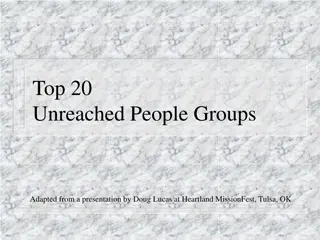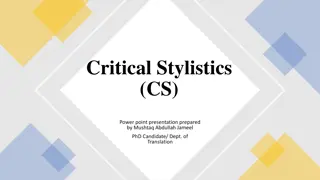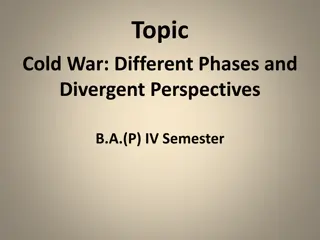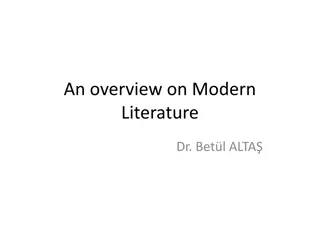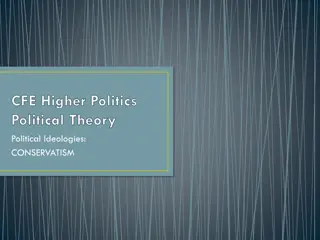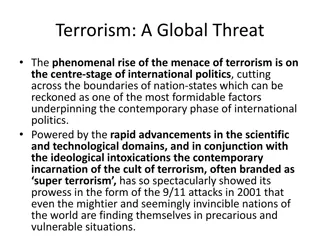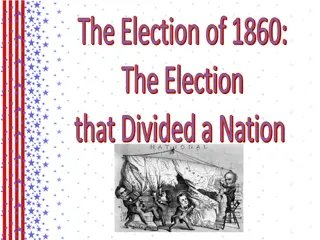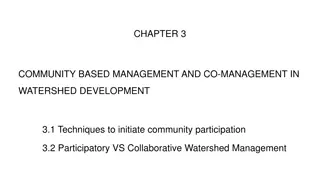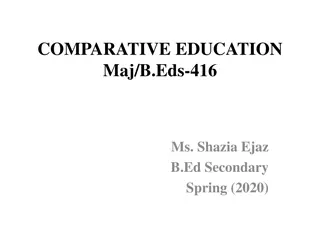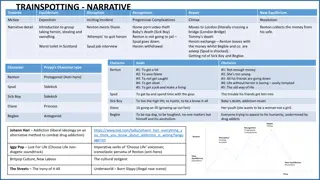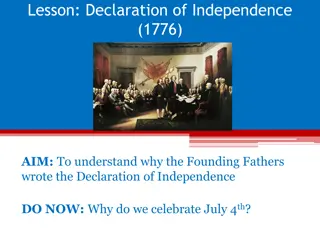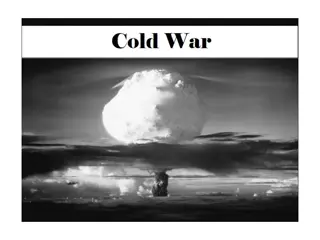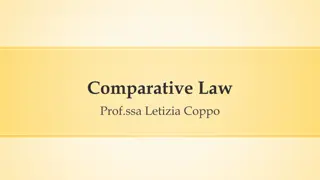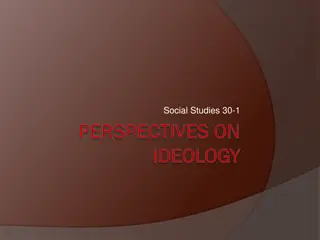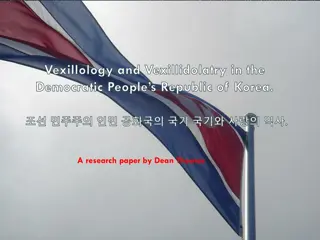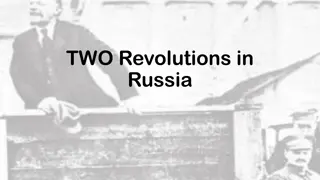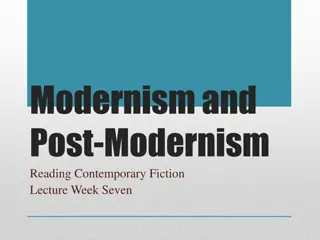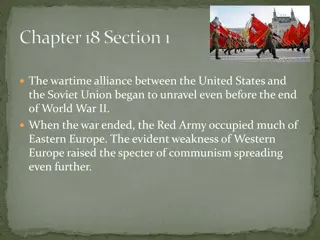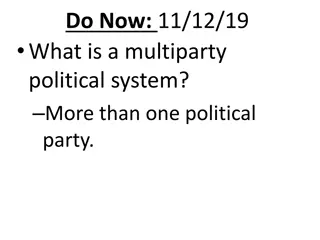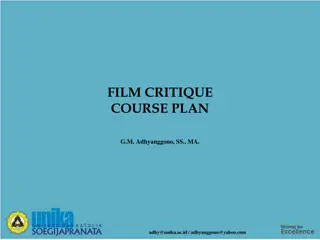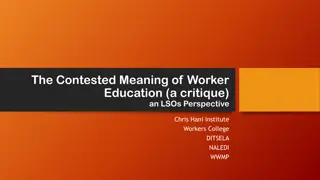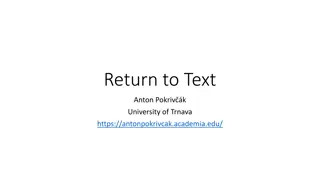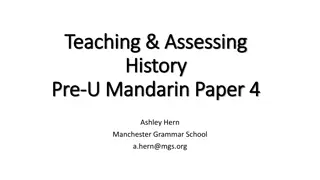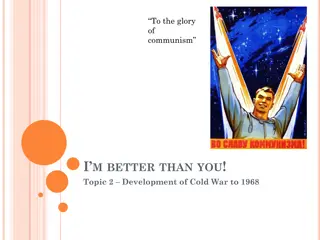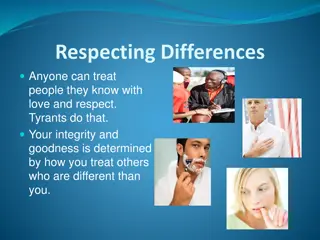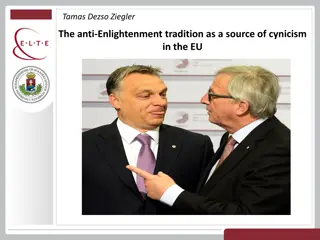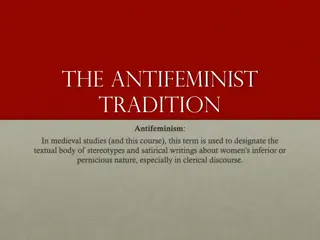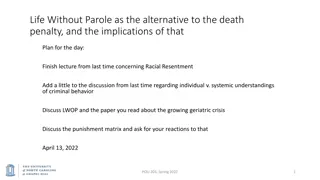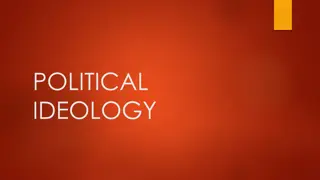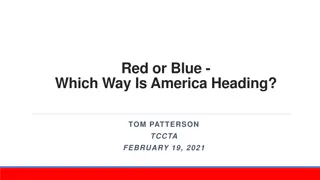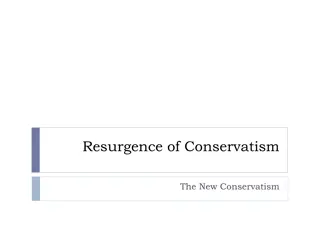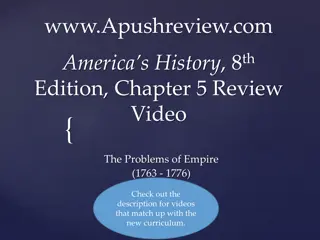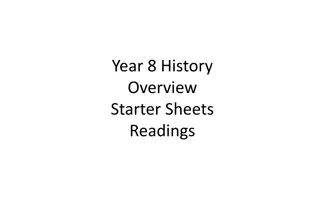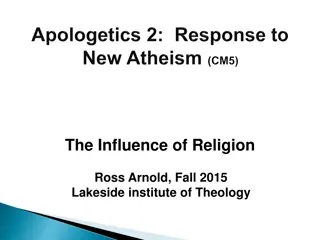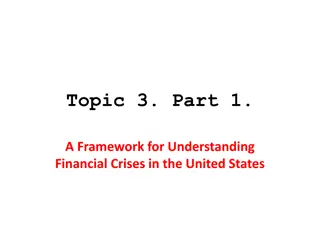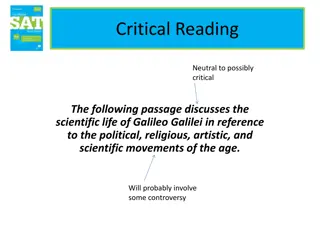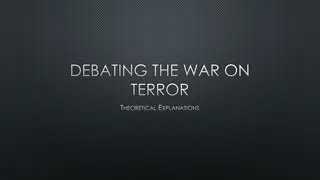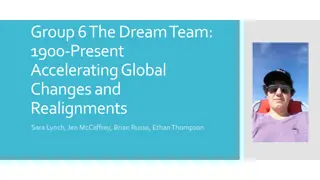Global Challenges Faced by Unreached People Groups
The top 20 unreached people groups face significant geographical, urban, ideological, social, and people challenges. The 10/40 Window encompasses areas with the highest concentration of unreached populations. Urbanization, diverse belief systems, social issues, and the lack of Christian presence con
0 views • 37 slides
Understanding Critical Stylistics: Tools and Application
Critical Stylistics (CS) is a method that delves into the ideological underpinnings of texts through the analysis of linguistic features. Developed by Jeffries, CS focuses on uncovering implicit ideologies embedded in texts by examining stylistic choices. By integrating stylistics and critical disco
2 views • 28 slides
Understanding the Cold War: Phases and Perspectives in B.A. IV Semester
Cold War, characterized by economic, political, and military competition between the US and Soviet Union, stemmed from ideological differences leading to global conflicts and proxy wars in the Global South, ultimately fueling neo-colonialism and neo-imperialism.
1 views • 15 slides
Evolution of Modern Literature in the 20th Century
The Modern Age in literature emerged in response to the Victorian era, marked by a shift in attitudes towards life and society. Influenced by historical, economic, and ideological factors such as World Wars, capitalism, and the disintegration of empires, Modern Literature explored new themes and sty
1 views • 14 slides
Understanding Conservatism: Origins and Principles
Conservatism emerged as a reaction to the upheaval of the French Revolution, valuing tradition, security, and social order. It emphasizes the preservation of traditional institutions and stability, with roots in the beliefs of Edmund Burke. Key features include a focus on human imperfection, traditi
0 views • 21 slides
Terrorism: A Global Threat in International Politics
The rise of terrorism as a global menace is a significant factor in contemporary international politics. Fueled by advancements in technology and ideology, terrorism poses a formidable challenge, exemplified by events like the 9/11 attacks. Efforts are needed to combat terrorism on both national and
0 views • 24 slides
The Election of 1860: A Divisive Campaign for the Future of the United States
The 1860 election was a significant moment in American history, marked by ideological divisions and the rise of Abraham Lincoln. The Republican Party, Southern Democratic Party, Democratic Party, Northern Democratic Party, and Constitutional Union all played crucial roles in shaping the outcome. The
1 views • 14 slides
Community-Based Management in Watershed Development
Techniques to initiate community participation in watershed management are crucial for sustainable development. Scholars classify participation levels into different categories, highlighting the importance of ideological motivation and voluntary engagement. The shift from direct intervention to part
0 views • 28 slides
Understanding Comparative Education: Scope and Aims
Comparative education involves studying educational theories and practices across different countries to analyze the relationship between education and society. It aims to explain educational systems, aid in the development of institutions, and form generalized statements applicable in various natio
0 views • 31 slides
Exploring Ideology and Narrative in Trainspotting
A deep dive into the narrative structure and ideological themes of the film Trainspotting, examining character goals, obstacles, and the protagonist's journey through addiction and self-discovery. The film's portrayal of addiction, socialism, liberalism, and post-Thatcherite counter-culture is explo
1 views • 7 slides
Understanding the Declaration of Independence and Colonial Perspectives
Explore the significance of the Declaration of Independence written by Thomas Jefferson and the differing perspectives of historians on the motivation behind the American Revolution. Learn about the ideological origins and beliefs of the colonists, their fears of tyranny under British rule, and the
7 views • 19 slides
The Cold War: Rivalry and Tension Between Superpowers
The Cold War, lasting from post-World War II to the 1980s, was defined by political tension and rivalry between the United States and the Soviet Union. Despite never engaging in direct military combat, both sides competed through political maneuvering and propaganda, impacting global conflicts and t
0 views • 11 slides
Legal Families of the World: Comparative Analysis
This study delves into the classification of legal systems into distinct families based on common features, examining various criteria such as historical sources, system structure, and ideological foundations. The challenges and fluid nature of categorizing legal systems are explored, highlighting t
0 views • 18 slides
Understanding Ideology and Society: Perspectives and Beliefs
Explore the significance of ideology in shaping societal perspectives, beliefs, and values. Understand the impact of ideologies on laws, societal structures, and individual behavior. Delve into concepts such as liberalism, individualism, and collectivism to gain insights into human societies through
4 views • 26 slides
Vexillology and Vexillidolatry in the DPRK: Symbols and Symbolism
Delve into the symbolism behind the flags and emblems of the Democratic People's Republic of Korea (DPRK) as showcased through a detailed exploration of their national flag, party flag, and emblem. Understand the historical significance, political undertones, and cultural representation embodied in
0 views • 40 slides
Two Revolutions in Russia: The March and November Revolutions of 1917
The year 1917 witnessed two significant revolutions in Russia - the March Revolution leading to the abdication of the Tsar and the formation of the Provisional Government, followed by the November Revolution where Lenin's Bolsheviks overthrew the Provisional Government and established the world's fi
0 views • 20 slides
Insights into Realism and its Critiques in Literature
Exploring the dominance of realist fiction in European literature, this content delves into the evolution of realism during the Enlightenment period, emphasizing its focus on mimicking social reality. It details the concept of mimesis and verisimilitude in creating a realistic narrative structure th
0 views • 19 slides
The Unraveling of the Wartime Alliance and the Beginnings of the Cold War
The chapter delves into the breakdown of the wartime alliance between the United States and the Soviet Union post-World War II. Tensions rose as the Red Army occupied Eastern Europe and communism seemed to spread. The Marshall Plan's role in restoring Western Europe, coupled with events like the Cze
1 views • 15 slides
Evolution of the American Political Landscape: A Historical Overview
Explore the development of the multiparty political system in the United States through the origins of the Democratic and Republican parties, tracing back to historical figures like Thomas Jefferson, James Madison, and Abraham Lincoln. Dive into the ideological spectrum, party histories, presidentia
0 views • 32 slides
Film Critique Course Plan by G.M. Adhyanggono, SS, MA
This course focuses on studying the relationship between film, literature, and culture, emphasizing how films embody ideological content. Students will analyze the elements of films, genres, and the connection between film elements and ideologies. With a comprehensive curriculum and objectives, the
0 views • 12 slides
Challenges and Perspectives on Worker Education in South Africa
The article delves into the challenges faced by the working class in the context of capitalism, neoliberalism, and gender inequalities in post-apartheid South Africa. It examines the impact of economic crises, political challenges, and the changing dynamics within the labor movement on worker educat
1 views • 20 slides
The Evolution of Literary Criticism in the Digital Age
Exploring the shifting landscape of literary studies in the 21st century, this analysis delves into the challenges traditional literature faces in a world dominated by media and technology. Emphasizing the importance of refocusing on the text itself and the concept of literariness, the discussion hi
1 views • 19 slides
Exploring Challenges and Opportunities in Teaching History
Dive into the challenges and opportunities faced in teaching history, focusing on Paper 4 of the U.Mandarin curriculum. Discover how to balance depth and breadth, manage teaching time effectively, and encourage independent study skills. Uncover the complexities of ideological issues and learn ways t
0 views • 19 slides
The Cold War Rivalry: 1950s-1960s Espionage and Arms Race
The period from the 1950s to the 1960s was marked by intense competition between the Soviet Union and the US in the realms of espionage, space exploration, and nuclear armament. The Cold War rivalry led to significant advancements in technology and heightened tensions, culminating in key events like
0 views • 7 slides
Embracing Diversity: A Path to Unity and Understanding
Embrace diversity by treating all with love and respect. Avoid disrespecting differences, as it can lead to negative consequences. Uphold ideological differences and be mindful of oppressing forces that impact various communities. Explore contrasting Western and Eastern/Native cultural values to fos
0 views • 7 slides
Exploring Anti-Enlightenment Traditions in the EU
This text delves into the concept of the anti-Enlightenment tradition and its influence on cynicism within the European Union. It analyzes the ideological roots, cultural implications, and political manifestations of this tradition, contrasting it with Enlightenment principles such as human rights,
0 views • 9 slides
Unveiling the Antifeminist Tradition: Ideological Roots, Textual Sources, and Female Nature
Explore the antifeminist tradition in medieval studies through a deep dive into its ideological roots, main textual sources, and portrayal of female nature. Discover how stereotypes and satirical writings about women's perceived inferiority have persisted throughout history, informed by clerical, in
0 views • 9 slides
Understanding Life Without Parole as an Alternative to the Death Penalty
Explore the complexities of the life without parole (LWOP) sentence as an alternative to the death penalty, touching upon topics such as racial resentment, systemic criminal behavior, the geriatric crisis in prisons, and the punishment matrix. Delve into the predictive model analyzing the use of the
0 views • 19 slides
Understanding Political Ideologies: Liberalism and Conservatism Explained
Political ideologies shape beliefs about the role of government and societal balance between the public and private sectors. Liberalism focuses on individual liberty and government intervention for equality, while conservatism emphasizes limited government, traditional values, and free markets. Psyc
0 views • 25 slides
The Divided States of America: A Look at Party Polarization
The images depict the growing party polarization in American politics, showing the widening gap between Republicans and Democrats since the 1980s. The data visualizations illustrate how the ideological divide has evolved over the years, culminating in high levels of animosity and competition between
0 views • 48 slides
The Resurgence of Conservatism in America
The resurgence of conservatism in America has brought about a clear distinction between conservative and liberal ideologies. Conservatives emphasize limited government intervention, promoting free-market principles, individual liberty, and moral values. On the other hand, liberals advocate for gover
0 views • 14 slides
Challenges of Empire: From Proclamation to Rebellion
During the period of 1763-1776, the British Empire faced challenges in America resulting from increased taxes, acts restricting colonial autonomy, and resistance from colonists. This led to a series of events including the Currency Act, Sugar Act, Stamp Act, and Townshend Acts, triggering protests,
0 views • 11 slides
The Scopes Monkey Trial: Clash of Cultures and Evolution Debate
Following World War I, the Scopes Monkey Trial in Tennessee marked a pivotal clash between urban and rural cultures over the teaching of evolution. The trial, prosecuted by William Jennings Bryan and defended by Clarence Darrow, resulted in teacher John Scopes being found guilty of violating the ant
0 views • 9 slides
European Medieval Society and the Clash of Christianity and Islam
Explore the historical context of European medieval society, focusing on feudalism, the Crusades, and the clash between Christianity and Islam. Discover how these events shaped the emergence of European civilization and led to significant cultural and religious transformations during the medieval pe
0 views • 9 slides
Exploring the Clash Between New Atheism and Biblical Morality
The clash between New Atheists and biblical morality is highlighted in their differing views on ethics, justice, and religious teachings. Christopher Hitchens and Richard Dawkins express skepticism towards biblical moral codes, while advocating for a secular set of ethical principles. The debate enc
0 views • 10 slides
Understanding Financial Crises in the United States: A Comprehensive Analysis
This framework explores the ideologies, interests, and institutions influencing financial crises in the US. It discusses the complexities of legislative responses, the impact of ideological transitions, and the role of political power and policy stickiness in shaping outcomes.
0 views • 16 slides
Galileo Galilei and the Clash of Worldviews in the Renaissance Era
Galileo Galilei, born in 1564, navigated the turbulent waters of a Europe divided by cultural, religious, and political upheavals. The backdrop of the Counter-Reformation and the clash between geocentric and heliocentric astronomical theories shaped Galileo's scientific endeavors, challenging establ
0 views • 14 slides
Perspectives on the War on Terror and the Clash of Civilisations
Academic and policy debates explore theoretical explanations surrounding the War on Terror, with discussions on the long-term threats, significance of 9/11, and clash of civilizations theory proposed by Samuel P. Huntington. The clash between Islam and the West is examined, critiquing the compatibil
0 views • 19 slides
Understanding the Cold War: Origins, Consequences, and Ideological Conflicts
Explore the origins, consequences, and ideological conflicts of the Cold War through key events like the Iron Curtain, Berlin Airlift, Korean War, and Cuban Missile Crisis. Learn about communism, democracy, and the impact of beliefs and ideals on attempts to stop the spread of communism during this
0 views • 16 slides
Global Conflicts and Revolutions: A Historical Perspective
The turbulent events of the 20th and 21st centuries, from the aftermath of WWI with the Treaty of Versailles to the devastating Rwandan Genocide in 1994, have shaped our world through wars, genocides, and ideological clashes. The rise of leaders like Hitler, the tragedy of Pearl Harbor, the Korean W
0 views • 7 slides
